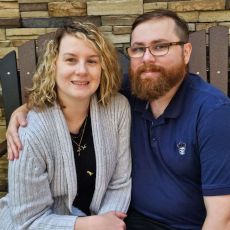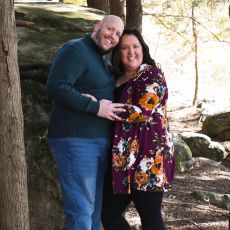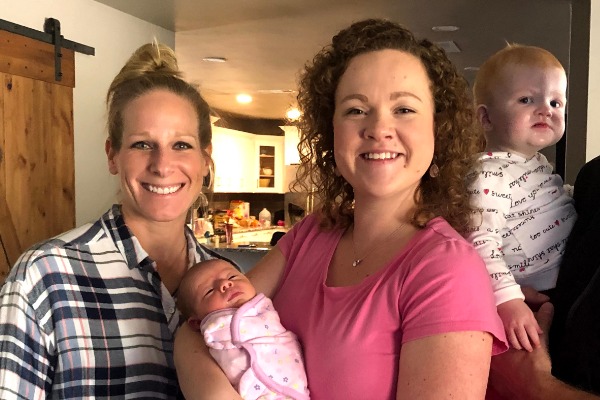Post-Adoption Depression for Birth Mothers [What You Need to Know]
You Are Never Alone

As a birth mother, you have experienced the joys of adoption and helped other people realize their lifelong dreams of parenthood. It is a beautiful, rewarding journey, but that doesn’t mean it’s a simple one. There are many complex emotions of adoption, which can lead to high and low moments alike long after the adoption takes place. For instance, you can experience postpartum depression as a birth mother.
To get free adoption information and help now, call us at 1-800-ADOPTION at any time. We are here for you whenever you need us. You are never alone.
In the meantime, though, we have created this detailed article that focuses on post-adoption depression for birth mothers. Continue reading to learn what you need to know about depression after adoption.
If you are in need of immediate help, then call 1-800-273-8255. Nothing in this article is medical advice, and you should talk to your doctor about your symptoms and treatment options.
Postpartum Depression [After “Giving a Baby up” for Adoption]
You may have heard of postpartum depression, but you may not have known that there is also post-adoption depression in birth mothers. It is completely normal for birth mothers like you to experience feelings such as grief or loss because adoption is an emotional challenge. Just like anyone who gives birth, you can also experience postpartum depression.
To provide a more scientific outlook, postpartum depression is when someone who has recently given birth experiences physical and emotional difficulties, according to the National Institute of Mental Health.
Postpartum after adoption is more common than you may think, and it often comes with a slew of symptoms, such as changes in hormone levels, anxiety, disturbing thoughts and more.
You can face an increased risk of postpartum depression after adoption if any mental health issues run in your family or if you have experienced postpartum depression with previous pregnancies. Still, no two adoption journeys are the same, so there will be a slew of different reactions to it depending on your unique situation.
According to the Mayo Clinic, here are some of the most common symptoms of postpartum depression:
- Sadness
- Irritability
- Anxiety
- Stress
- Loss of focus
- Appetite problems
- Difficulties with sleeping
Remember that, if you need immediate help, you can call 1-800-ADOPTION at any hour, whether it is 4 p.m. or 4 a.m. Post-adoption depression for birth mothers is normal, and you are never alone. You can also reach the National Suicide Prevention Lifeline at 1-800-273-8255.
Helpful Information
How to Cope with Birth Mother Depression after Adoption [What You Can Do]
There’s no doubt that these symptoms can be harmful, so it’s best to treat them as soon as you can. We should also mention that it’s important to differentiate between normal feelings of grief and loss and postpartum depression after “giving a baby up” for adoption.
Take a look at the list of symptoms above and see if you are experiencing typical feelings of grief and loss or postpartum depression. If you’re not sure, remember you can always talk to your adoption counselor and reach out to your medical professional for help.
Also, there’s something that we’d like to clarify. You may have noticed that we use the phrase “giving a baby up for adoption” in quotes, and there’s a reason for that. It’s one of the most common phrases that people use when they talk about adoption.
Though they may be well-meaning, this phrase completely misses the point. Adoption is not “giving up.” When you chose adoption, you made a selfless, loving and heroic sacrifice, and that is beautiful.
With that being said, here are some steps that you can take to ease post-adoption depression for birth mothers:
- Talk to your adoption counselor. Depending on the adoption agency you worked with, you may have access to free, 24/7 counseling to help you navigate any complex emotions. American Adoptions offers this service to all birth mothers who have worked with us, and one of our trusted professionals would be happy to help you whenever you need them. You can reach us any time at 1-800-ADOPTION.
- Speak with your primary care physician. If you find yourself struggling with symptoms of postpartum depression after adoption, then it can be helpful to talk over it with your doctor. They may be able to screen you for any indications of postpartum depression, and they can prescribe you any necessary medications. Also, keep in mind that adoption is free for birth mothers, so in many states, adoption financial assistance may be able to help cover your pregnancy- and adoption-related costs. However, it is important to seek treatment early, as most states only approve expenses for a limited time postpartum.
- Build a support system. We all need people to lean on during times of need. That’s why it’s important to build an adoption support system consisting of close family members and friends. Adoption is an emotional journey, and no one should have to go through it alone. Speak with these people and ask for their support. Also, there are plenty of birth parent support groups out there if you would like to join one for the time being.
- Maintain a healthy lifestyle. From a general standpoint, exercising and eating well on a regular basis isn’t just good for your physical health; it’s also beneficial for your mental health. If you find yourself grappling with postpartum after adoption, then it could also be a good idea to stay away from substances such as drugs and alcohol.
- Stay in touch with your child and the adoptive family. You may have chosen open adoption, in which case you can keep in touch with your child and their adoptive family. It could be a good idea to reach out to them and ask for an update. When you see that your child is growing up happy and healthy with a loving family, this can provide the reassurance that you’ve been looking for. You might also discover that it helps relieve some post-adoption depression in birth mothers like you.
Also, it’s worth mentioning that adoptive parents can also experience something similar to postpartum depression after adoption. To be specific, this is known as post-adoption depression, and it is completely normal for adoptive parents to experience complex emotions such as sadness or anxiety after bringing their child home. If this describes your situation, then help is always available at 1-800-ADOPTION.
***
This can be a lot of information to soak in at once, so it’s normal to have some more questions about post-adoption depression for birth mothers. That’s why we are always here for you at 1-800-ADOPTION. We’re looking forward to hearing from you!
Disclaimer
Information available through these links is the sole property of the companies and organizations listed therein. American Adoptions provides this information as a courtesy and is in no way responsible for its content or accuracy.







































